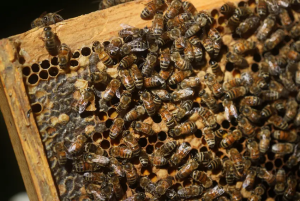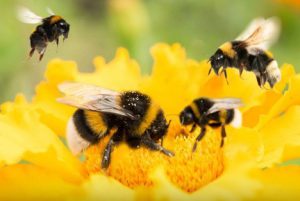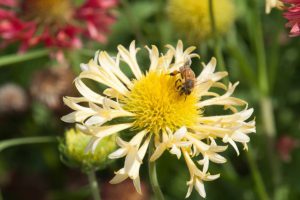Texas beekeepers afraid this new legislation will sting
The Texas Legislature wants to crack down on who can claim their honey is made in Texas. Beekeepers say the proposed legislation is too stiff and doesn’t take into account real-world production issues.

State lawmakers are debating a bill that would forbid Texas beekeepers from labeling their product as made in Texas if it contains a single drop of honey from another state. Beekeepers say the legislation doesn’t take into consideration real-world production problems. Credit: Joe Rondone/The Commercial Appeal-USA TODAY via REUTERS
State lawmakers are moving forward with a bill that could potentially land Texas honey producers in jail for mislabeling their products, creating a buzz in the beekeeping community.
House Bill 590, authored by Rep. Ernest Bailes, R-Shepherd, states that a product cannot be labeled as “Texas honey” unless the product consists “exclusively” of honey produced from apiaries in the state.
While the concept of the bill seems simple, Texas beekeepers say it could sting producers and their livelihood. According to Texas A&M’s AgriLife agency, Texas contributed 8.9 million pounds of honey — worth $17 million — to the national honey production.
“There’s a lot of things out there we need to address in labeling honey; this one is just not quite where it needs to be,” said Dodie Stillman, president of the Texas Beekeepers Association.
Running one of Texas’ 157,000 honey-producing colonies can get complicated. Weather conditions could make it difficult to produce enough honey for a business, so some will create a Texas-heavy blend with honey from other states. Relabeling products can get expensive or even lead to a loss for some producers. Beekeepers on border territories can have nectar DNA that inevitably blends between the two states.
But even with all the room for error, HB 590 would effectively make mislabeling Texas honey products a class B misdemeanor and potentially send a producer to jail for up to 180 days.
In an effort to soften the legislation, Rep. Cecil Bell Jr., R-Magnolia, proposed an amendment that would allow honey producers to label their product “made in Texas” as long as it consisted of “predominantly” Texas honey.
“This bill is not a bad bill inherently, but I do think if we don’t pay attention to what’s going on, there may be some consequences,” Bell said during a recent debate on the House floor.
Rep. Brian Harrison, R-Midlothian, spoke in support of Bell’s amendment, explaining how his constituents could also be affected because of how the bill is tailored.
“How many of our constituents do you think we should subject to …Texas prisons, who have done nothing more than make and sell honey?” Harrison asked.
Bell answered, “If we have one in jail, that’s more than we need to have in jail for producing Texas honey.”
The amendment ultimately failed.
The bill’s genesis came from a constituent in Bailes’ district. The state’s beekeepers association is neutral on the bill, an association spokesperson said.
“I think everybody agrees helping consumers know where their honey is from is a good idea,” said Leesa Hyder, the association’s legislative committee leader. “The question is, does this bill really do that?”
Hyder added there’s also a concern about how producers can prove their honey was made in the boundaries of the state.
Hyder said there was not time or opportunity for the association to address the problems with the bill — such as potential for consumer confusion, legal battle for producers and the uncertainty on whether this will even help make Texas honey more profitable. The association will remain neutral on the bill as it moves over to the Senate in coming weeks.
During the debate, Bailes compared it to his ranching business in defense of the bill.
“If we have a drought, and I have cattle grazing on grass, for grass-fed beef, and I start feeding them grain, it’s no longer grass-fed beef,” Bailes explained. “That’s as simple as it gets. We are better than simply saying it should be ‘predominantly’ and dilute ourselves for the almighty dollar.”
We are here to share current happenings in the bee industry. Bee Culture gathers and shares articles published by outside sources. For more information about this specific article, please visit the original publish source: Texas beekeepers face possible jail time under proposed legislation | The Texas Tribune





